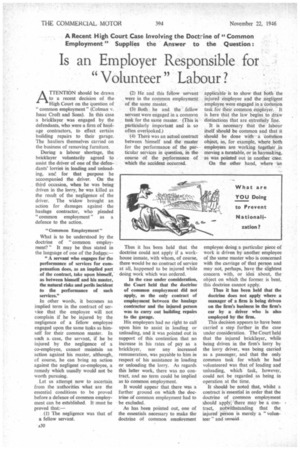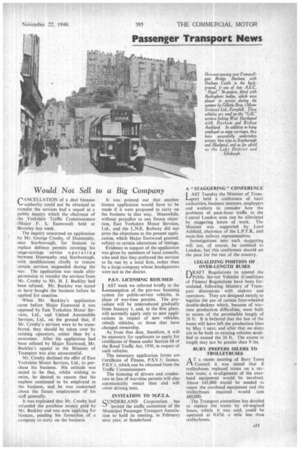Is an Employer Responsible for " Volunteer " Labour?
Page 32

Page 33

If you've noticed an error in this article please click here to report it so we can fix it.
ATTENTION should be drawn to a recent decision of the High Court on the question of "common employment" (Colman v. Isaac Croft and Sons). In this case a bricklayer was engaged by the defendants, who were a firm of haulage contractors, to effect certain building repairs to their garage. The hauliers themselves carried On the business of removing furniture.
During a labour shortage, the bricklayer voluntarily agreed to assist the driver of one of the defendants' lorries in loading and unloading, and for that purpose he accompanied the driver. On the third occasion, when he was being driven in the lorry, he was killed as the result of the negligence of the driver. The widow brought an action for damages against the haulage contractor, who pleaded "common employment" as a defence to the action.
"Common Employment" What is to be understood by the doctrine of "common employ ment?" It may be thus stated in the language of one of the Judges:— " A servant who engages for the performance of services for compensation does, as an implied part of the contract, take upon himself, as between himself and his master, the natural risks and perils incident to the performance of such services."
In other words, it becomes an implied term in the contract of service that the employee will not complain if he be injured by the negligence of a fellow employee engaged upon the same tasks as himself for their common master. In such a case, the servant, if he be injured by the negligence of a co-employee, cannot maintain an action against his master, although, of course, he can bring an action against the negligent co-employee, a remedy which usually would not be worth pursuing.
Let us attempt now to ascertain from the authorities what are the essential conditions to be proved before a defence of common employment can be established. It must be proved that:— (1) The negligence was that of a fellow servant. (2) He and this fellow servant were in the common employment of the same master.
(3) Both he and the fellow servant were engaged in a common task for the same master. (This is particularly important and is so often overlooked.) (4) There was an actual contract between himself and the master for the performance of the particular services in question, in the course of the performance of which the accident occurred.
Thus it has been held that the doctrine could not apply if a work house inmate, with whom, of course, there would he no contract of service at all, happened to be injured while doing work which was ordered.
In the case under consideration, the Court held that the doctrine of common employment did not apply, as the only contract of employment between the haulage contractor and the injured person was to carry out building repairs to the garage.
His employers had no right to call upon him to assist in loading or unloading, and it was pointed out in support of this contention that no increase in his rates of pay as a bricklayer, nor any increased remuneration, was payable to him in respect of his assistance in loading or unloading the lorry. As regards this latter work, there was no contract, and no term could he implied asto common employment.
It would appear that there was a further ground on which the doctrine of common employment had to be excluded.
As has been pointed out, one of the essentials necessary to make the doctrine of common employment applicable is to show that both the injured employee and the negligent employee were engaged in a common task for their common employer. It is here that the law begins to draw distinctions that are extremely fine.
It is necessary that the labour itself should be common and that it should be done with a common object, as, for example, where both employees are working together in moving a turntable, or in haymaking. as was pointed out in another case.
On the other hand, where an employee doing a particular piece of work is driven by another employee of the same master who is concerned with the carriage of that person and may not, perhaps, have the slightest concern with, or idea about, the object on which the former is bent, this doctrine cannot apply.
Thus it has been held that the doctrine does not apply where a manager of a firm is being driven on the firm's business in the firm's car by a driver who is also, employed by the firm.
This decision appears to have been carried a step further in the case under consideration. The Court held that the injured bricklayer, while being driven in the firm's lorry by the lorry driver, was being carried as a passenger, and that the only common task for which he had volunteered was that of loading and unloading, which task, however. could not be regarded as being in operation at the time.
It should be noted that, whilst a contract is:essential in order that the doctrine of common employment should apply; there may be a contract, notwithstanding that the injured person is merely a " volunteer " and tinnaid
CANCELLATION of a deal because authority could not be obtained to transfer the services had a sequel at a public inquiry which the chairman of the Yorkshire Traffic Commissioners (Major F. S. Eastwood) held at Beverley last week.
The inquiry concerned an application by Mr. George Crosby, of Hunmanby, near Scarborough, for licences to replace defence permits covering his stage-carriage service ope ra t ing between Humnanby and Scarborough, with modifications chiefly to restore certain services suspended during the war. The application was made after permission to transfer the services from Mr. Crosby to Mr. H. J. Buckley had been refused. Mr. Buckley was stated to have bought the business before he applied for sanction.
When Mr. Buckley's application came before Major Eastwood it was opposed by East Yorkshire Motor Services, Ltd., and United Automobile Services, Ltd., on the ground that, if Mr. Crosby's services were to be transferred, they should be taken over by existing operators, rather than by a newcomer. After his application had been refused by Major Eastwood, Mr. Buckley's appeal to the Minister of Transport was also unsuccessful.
Mr. Crosby declined the offer of East Yorkshire Motor Services, Ltd., to purchase his business. His attitude was stated to be that, whilst wishing to retire, he desired to ensure that his nephew continued to be employed in the business, and, he was concerned about the future employment of his staff generally.
It was explained that Mr. Crosby had refunded the purchase money paid by
r. Buckley and was now applying for licences, pending his formation of a company to carry on the business. It was pointed out that another licence application would have to be made if it were proposed to carry on the business in that way. Meanwhile, without prejudice to any future objection, East Yorkshire Motor Services, Ltd., and the L.N.E. Railway did not press the objections to the present application, which Major Eastwood granted, subject to certain alterations of timings.
Evidence in support of the application was given by members of local councils, who said that they preferred the services to be run by a local firm, rather than by a large company whose headquarters were not in the district.
P.S.V. LICENSING RESUMED
I AST week we referred briefly to the Laresumption of the pre-war licensing system for public-service vehicles, in place of war-time permits. The procedure will be reintroduced gradually from January 1, and, in the first place, will normally apply only to new applications in respect of new vehicles. rebuilt vehicles, or those that have changed ownership.
As from that date, therefore, it will be necessary for applicants to apply for certificates of fitness under Section 68 of the Road Traffic Act, 1930, in respect of such vehicles.
The necessary application forms are Certificate of Fitness, P.SN.3; licence. P.S.V.1, which can be obtained from the Traffic Commissioners The licensing of drivers and cOnductors in lieu of war-time permits will also automatically restart then and will cover driving tests.
INVITATION TO M.P.T.A.
QUNDERLAND Corporation has
invited the traffic committee of the Municipal Passenger Transport Association to hold its meeting, in February next year, at Sunderland.
A "STAGGERING" CONFERENCE I AST Tuesday the Minister of Trans.1-4port held a conference of local authorities, business interests, employers and workers to consider how the problems of peak-hour traffic in the Central London area can be alleviated by staggering hours of work. The Minister was supported by Lord Ashfield, chairman of the L.P.T.B., and main-line railway representatives.
Investigations into such staggering will not, of course, be confined to London, but this conference should set the pace for the rest of the country.
LEGALIZING POSITION OF OVER-LENGTH BUSES
DRAFT Regulations to amend the L./Public Service Vehicles (Conditions of Fitness) Regulations have been formulated, following Ministry of Transport discussions with makers and operators. They are designed merely to legalize the use of certain four-wheeled double-deckers which, because of wartime production difficulties, were built in excess of the permissible length of 26 ft. It is believed that the last of the buses will have left the production lines by May I next, and after that no more are to be built or existing vehicles modified to exceed the 26 ft. The excess in length may not be greater than 9 ins.
BURY PREFERS OILERS TO TROLLEYBUSES
A T a recent meeting of Bury Town
Council it was stated that if trolleybuses replaced trams on a cettain route, a re-alignment of the overhead equipment would be involved. About £41,000 would be needed to renew the overhead equipment and the trolleybuses required would cost £80,000.
The Transport committee has decided to replace the trams by oil-engined buses, which, it was said, could be operated at 0.67d. a mile less than trolleybuses.




































































